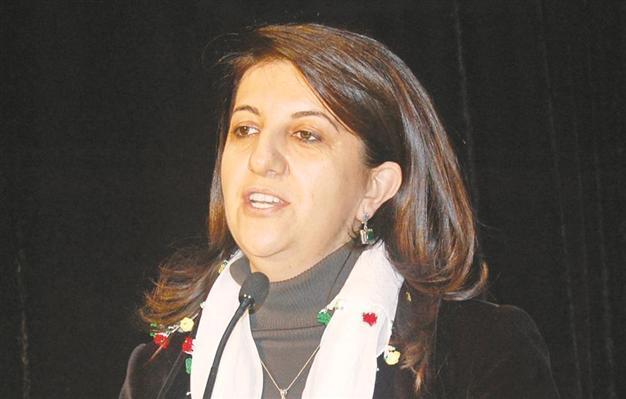Ruling party seeks BDP’s aid for charter
ANKARA - Hürriyet Daily News

Buldan outlines her party’s coditions for new charter talks. DHA Photo
A rapprochement between the ruling Justice and Development Party (AKP) and the Peace and Democracy Party (BDP) aimed at building a new constitution together in case of disagreement within the joint charter panel has become more and more likely as the BDP has put forward four conditions as sine qua non for such an agreement.A re-definition of citizenship, the lifting of all restrictions on the usage of mother tongue in the public sphere, strengthening local administrations and securing full freedom of faith are the BDP’s four conditions to take “a joint step” with the AKP, BDP deputy Parliamentary Group Chair Pervin Buldan told the Hürriyet Daily News on Feb. 10.
“Those four conditions are sine qua non for us. It would be meaningless to talk about a joint step if those demands were not considered,” Buldan said. “Of course we wish to make a new constitution together with all parties in Parliament, but unfortunately it seems unlikely,” she said.
A senior AKP official claimed the BDP’s conditions were reasonable, but voiced his dissenting opinion for their demand regarding usage of mother tongue in the public sphere.
“Our main objective is to make the new constitution. Whoever lends support, we would welcome it. If this is the BDP; we would welcome it too,” Burhan Kuzu, the head of Parliament’s Constitution Commission, was quoted as saying by daily Taraf.
Acting with the BDP is a necessity not a choice for the AKP, Kuzu said, recalling that the AKP did not currently have a sufficient number of parliamentary seats to pass the constitutional amendment alone.
Three of the four conditions of the BDP are reasonable, but demanding education in mother tongue is unacceptable, according to Kuzu. “I’m against education in mother tongue. It will lead to the disintegration of the country. Belgium is the typical example of it. We should not experience it,” Kuzu said.
In response Buldan said the BDP does not consider Kuzu’s remarks to be the AKP’s official stance, adding that they take only the statements of government officials seriously.
The debate on a possible AKP-BDP cooperation for the new constitution was triggered when Prime Minister Recep Tayyip Erdoğan recently said his party could bring the draft Constitution to a referendum together with the BDP.
“Our parliamentary seats are not enough to reach the required quorum to make a constitutional amendment. But if we can agree with the BDP, we can take steps together with them in order to reach 330 votes in Parliament,” Erdoğan said Feb. 7 during an interview with reporters while returning from a mission to Eastern Europe.
A minimum of 330 votes are required for a constitutional change, while any motion accepted with between 330 and 367 votes goes directly to a referendum. The total number of seats occupied by the AKP is 326.
BDP co-chair Selahattin Demirtaş gave the green light to the idea of an AKP-BDP cooperation for the new constitution over the weekend.
Emphasizing that the BDP’s first choice would be a draft with the widest possible consensus, he nevertheless said they were open to alternatives, daily Milliyet reported. “We don’t exactly overlap, but the party with whom we have more common ground with is the AKP,” he said.
MHP leader Devlet Bahçeli, for his part, harshly condemned the possible AKP-BDP agreement for the new constitution, arguing that cooperating with the BDP means cooperating with the outlawed Kurdistan Workers’ Party (PKK).
“The prime minister pushed the button to make the constitution together with the PKK. Erdoğan has warmly embraced the BDP, whom he previously accused of being substitutes of a terrorist organization and being necrophiles,” Bahçeli said.
Separately, the AKP will launch a publicity campaign for its presidential system proposal, the Turkish media reported yesterday. The AKP will organize a series of conferences in several cities and academicians and professors will lecture people about AKP’s controversial presidential system proposal.
















